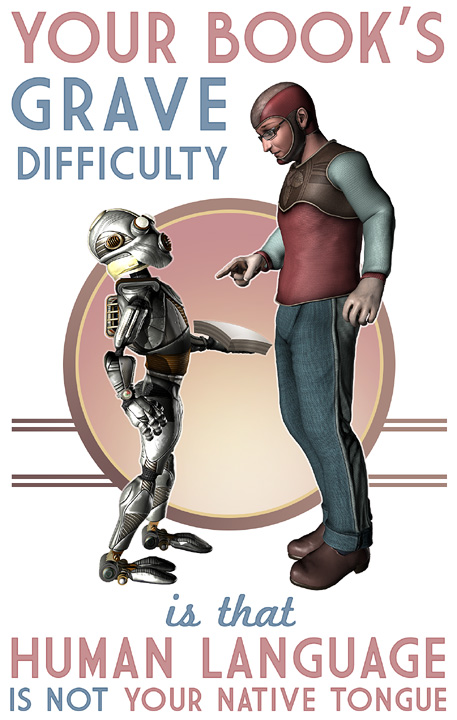
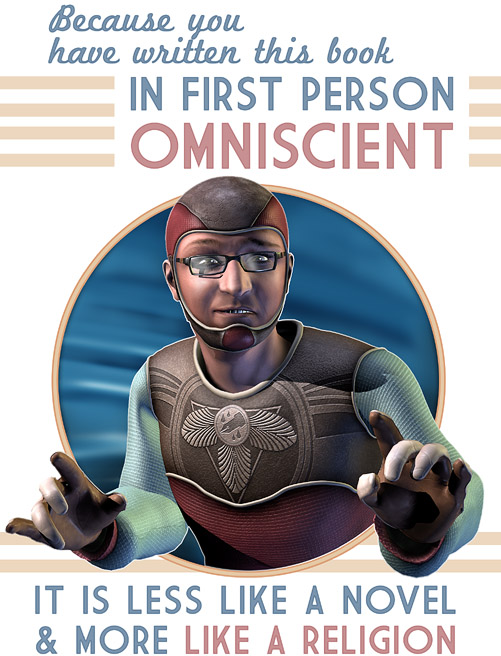
My imaginary editor strikes from the shadows, as swift as a serpent and as inscrutable as something that defies being scruted. This week, he’s criticizing our book’s point of view.
And this book, whatever it is, seems to have made an unusual choice. I won’t say it’s never been done (not lately, anyway) but these days the idea of a first person narrator who knows all and sees all would be a departure. My preference would be a first person narrator who knows all, and sees all, but doesn’t tell all; or, better yet, one who lies.
Even though I’m almost positive that the imaginary editor is not editing my book, this does touch on Slaves of the Switchboard of Doom. That’s because my book has a narrator who is a character. He’s just not a character in that book.
This was such an odd circumstance that there was no room in the book to explain it. And odder still is the fact that within a story, this narrator always refers to himself in the third person. You may have figured that out if you read The Lair of the Clockwork Book.
It’s another one of those weird correspondences I keep finding between the imaginary editor’s notes and the book I actually wrote. But I guess the harder you look, the more you find.
This entry was posted on Friday, October 9th, 2015
and was filed under Imaginary Editor
There have been no responses »
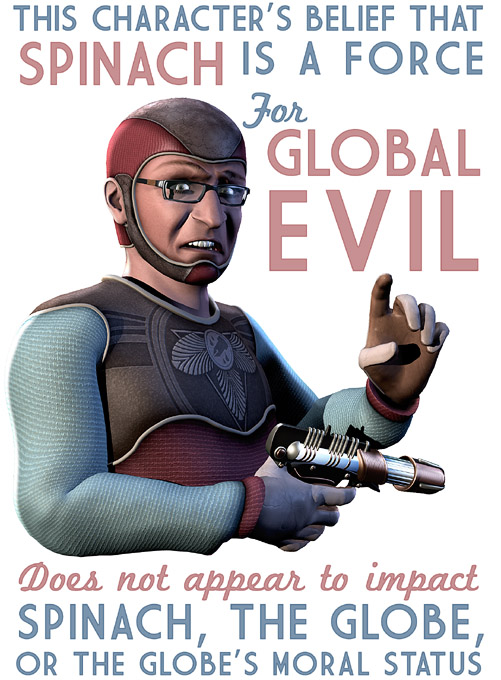
Well, here we are again. I continue to get weekly notes from my imaginary editor, for reasons that may be more clear if you catch up.
And honestly, after the revelation that my imaginary editor is editing what may be an imaginary book, I’m pretty relaxed about the whole thing. So let’s just look at this in a calm, curious spirit. There might be something we can learn from it.
I can see that the imaginary editor has an interesting point. We give characters tics and foibles and unusual ideas to help us – and the reader – to know that character as a unique person. Some of these are minor; some are extreme.
In a case where a character has an extreme view it makes sense that this should have something to do with the story. (That the miniscule orange octopi really are crawling over her skin; or that the miniscule orange octopi are, in fact, a delusion that’s explained when we learn that unusually large orange octopi from space have released a hallucenogenic drug into the Earth’s atmosphere.) I get that. The character’s peculiar quirk turns out to be essential to the story, often in a way that’s surprising.
But this? I mean, spinach is a force for global evil. This can’t be seen as unexpected, or revelatory, or insane. It’s just a fact.
Spinach infects our parents with some kind of mind control when they’re children. Then it forces them to expose us to its vile influence while we ourselves are young and helpless. It’s kind of like Toxoplasmosis.
Everybody knows this. So what’s the big reveal, here?
Something about this is odd. In my notes for one of the characters in Slaves of the Switchboard of Doom I’m sure I mentioned the truth about spinach: but none of that made it into the final draft. So once again I’m left to wonder exactly what book my imaginary editor is talking about. It doesn’t seem to be my book, but… now and then there’s one of these weird coincidences that sounds like my book. It’s starting to get kind of creepy.
This entry was posted on Thursday, October 1st, 2015
and was filed under Imaginary Editor
There have been 2 Responses »
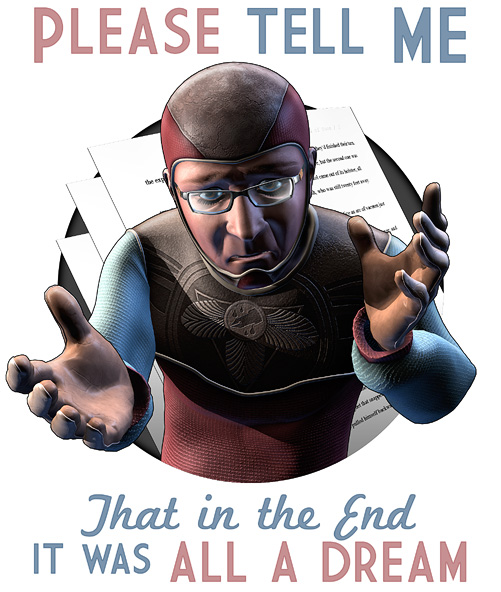
It’s that time of the week once more: the time when I get feedback from my imaginary editor. (For those who came in late, you can catch up here.)
Last week I decided that my imaginary editor might not be insane, after all: that he might, just possibly, be editing somebody else’s book. If that’s true, then his notes are really meant for another person… and for all I know that person may also be imaginary. So I shouldn’t take these notes too personally. Right?
In that spirit I have to say that this week’s note is really interesting.
How bad does a book have to be before “And then he woke up” is an improvement? I mean, we’re talking Eye of Argon bad, here. Manos: the Hands of Fate bad. Completely unredeemable. Atrociously, nauseatingly bad. Bad on the scale of the stars.
Whatever it is that he’s editing, I’d kind of like to read it now. Or – better yet! – make somebody else read it while I monitor the electroencephalograph and stand ready with a bucket full of ice.
This entry was posted on Wednesday, September 23rd, 2015
and was filed under Imaginary Editor
There have been 2 Responses »

First things first: my imaginary editor is armed again. It’s a development I can’t ignore.
If you haven’t met this evil twin of my actual, non-imaginary editor, try looking here. No promises, but it might help.
Second things second: my imaginary editor has raised an important point. One has to be careful with words, and especially with names. The fact is that on my second pass through Slaves of the Switchboard of Doom I saw that I’d given the same first name to two different secondary characters. In each case, that name had seemed perfect. But those duplicate names would have stood out in a way that certainly didn’t serve the book; so one of them had to become Evelyn. It wasn’t a fate worse than death, or anything.
Things are even more confusing in the case we see here. A Kiwi is a Kiwi is a Kiwi, but if two or more kinds of Kiwi appear together you ought to have a good reason for it; and you should make it clear which one is which, unless confusion is the actual point. Example: if three Kiwis walk into a bar and one of them explodes, it should normally be clear whether that was the fruit, the bird, or the New Zealander.
All of this is pretty obvious. So in a scene where I blew up one of three otherwise non-flammable Kiwis I should expect that the reader might be confused.
Third things third: I haven’t done that. There is no scene in Slaves of the Switchboard of Doom in which a Kiwi explodes. The reason I know that, even without looking, is that there are no Kiwis in my book. Not a bird, not a fruit, and not a New Zealander. They just aren’t there. Baboon? Yes. Something sort of like a squid? Yes. Kiwi? No.
This seems to confirm what I’ve suspected for several weeks now. My imaginary editor is editing an imaginary book.
I don’t know what to do about it. For the past six weeks I’ve been doing my best to act on these editor notes, and now I discover that they’re not even for my book.
I guess I have an obligation to look for the imaginary author who should have been getting these notes. Somewhere there’s an imaginary contract whose delivery dates depend on these changes. I just don’t know where to start.
Maybe in New Zealand.
This entry was posted on Wednesday, September 16th, 2015
and was filed under Imaginary Editor
There have been no responses »
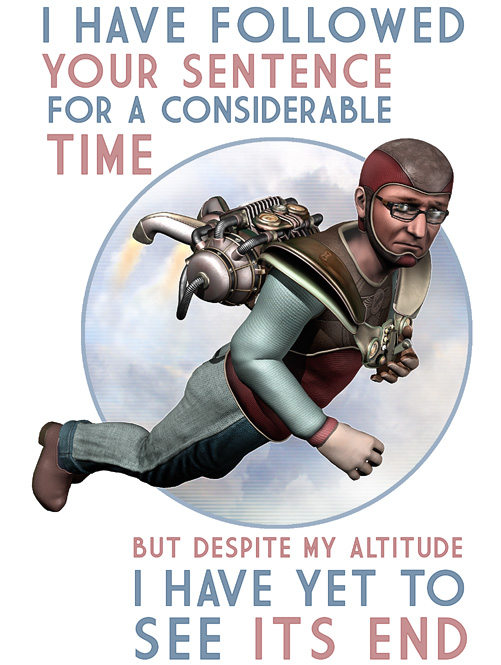
It’s a new (or newish) week, and so I’ve received my weekly feedback from my imaginary editor. If you haven’t met him before, you can catch up here, here, here, and here. Go ahead: I’ll wait till you get back.
He seems to have kept to that pensive mood we saw in his last message. But at the same time… I sense a return to his original brutal malicious uncompromising assessment of my book, Slaves of the Switchboard of Doom. It’s subtle, but it’s there.
And I guess I can’t deny that a sentence will sometimes develop sentience and leap off the page, eating the cat, if applicable, or otherwise the dog, on its way through the window and into the street outside where it’s likely to cause a car wreck – or, conceivably, a train wreck – before it slinks off into the shrubbery and into its own intensely private, eventful, and undeniably long life in which periods are far outnumbered by semicolons. It can happen.
But on the other hand a long sentence that seems to wander can be a great setup for a quick, pithy punchline that slaps the reader right in the brain before he or she knows what’s happened. Which is pretty great.
I was sure that in my many editing passes I had winnowed out the ones that didn’t do that, and left only those that did. But I can’t tell. That’s because my imaginary editor never got around to telling me which sentence he’s talking about.
Maybe it was Chapter Twelve.
Anyway, I’m off to figure that out and to daydream about the return of my actual editor. As one does, in moments like these.
This entry was posted on Wednesday, September 9th, 2015
and was filed under Imaginary Editor
There have been no responses »
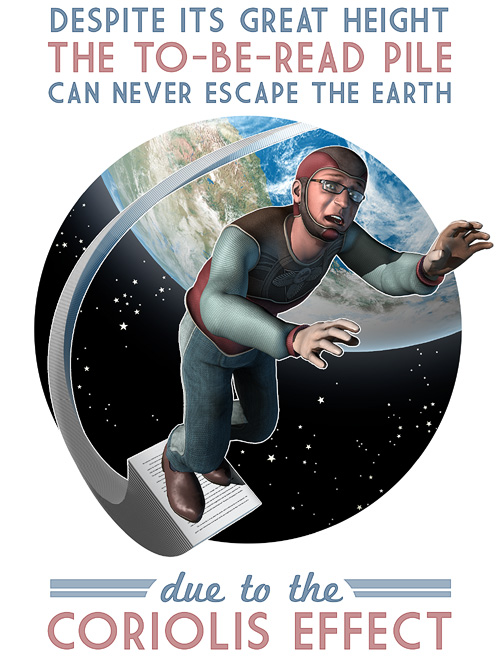
As is his habit, my imaginary editor has sent me his weekly feedback. (Confused? This all started here, then continued here and here).
Up to last week this evil twin of my actual editor was on an escalating cycle of negativity. I’m not ashamed to admit that I was pretty apprehensive while I waited for his newest message. So when I saw this one, I had to sit back and consider what it might mean.
This really looks like a play for sympathy, doesn’t it? Maybe last week – when I called him on his plagiarism – he decided to back off. Or maybe he’s trying to tell us that even a Mirror Universe editor has his problems. Or maybe he’s just softening me up for next week’s bombardment of red ink which, by the way, never washes out.
I like to think I’m a compassionate person. So I probably shouldn’t be smiling quite so much when I see that he forgot to pack his space helmet. Should I?
Anyway, there’s an upside. Just eight more weeks of this… and we’ll have a calendar!
This entry was posted on Wednesday, September 2nd, 2015
and was filed under Imaginary Editor
There have been no responses »
This may confuse you. It confused me. In your case, though, I may be able to clear things up by directing you here and here, where you’ll find that in my real world editor’s absence I’ve been taking feedback from my imaginary editor, instead.
This may not be less confusing. I can’t help you there.
I’ve got two big objections to my imaginary editor this week. Since it’s just you and me here, I’m going to share them.
First off, this week’s feedback isn’t constructive. In fact it crashes through the walls of constructive criticism and roars down the road through a cascade of nuns and orphans, only to plow into a ditch filled with kittens; then it explodes into a roiling, toxic cloud of what we have to call destructive criticism.
This may sound harsh.
Honestly, though, how am I supposed to improve my manuscript based on this kind of feedback? I’d have to travel back in time and make sure that human language was at the top of my to-do list before I even got out of the crib. And, you know, that’s pretty much how I think things went. I mean, my ‘first word’ was actually a complete sentence, which was “Get this stuff off of me!”.
So the utter brutality of this message is my first objection.
My second objection to this is that I have it on pretty good authority that it’s not even original. The story is that Harlan Ellison, at a writers’ workshop, once delivered this same bombshell to a writer who I’m pretty sure was not having the best day of his or her life just then.
So my imaginary editor cheats. Of course if you’re going to steal it’s good practice to steal from the best, and that would have to be Ellison. But it’s still stealing.
So I’m wondering whether I can leverage this plagiarism in some way. Risky, I know. But I’m starting to suspect that the history of publishing may be filled with these little stories of extortion, blackmail, and mayhem. There’s Christopher Marlowe, for example. There’s François Villon. And there’s my imaginary editor.
Times like these, I really wish I could have my real editor back. He seems like such a nice guy, especially now that I’ve seen the alternative.
Publishing? Not for the squeamish. Not for the weak. And apparently not for robots, either.
This entry was posted on Tuesday, August 25th, 2015
and was filed under Imaginary Editor
There have been 2 Responses »
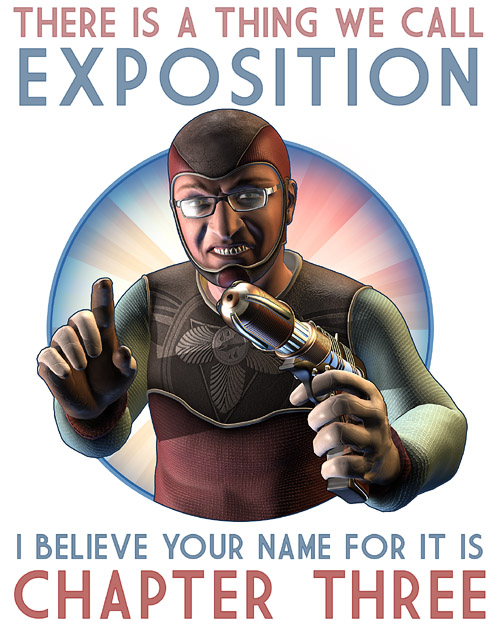
So, if you’ve been paying attention, you know that I’ve been getting editor’s notes from the Bizzarro World, Mirror Universe evil twin of my actual editor. He’s tough, but he’s fair.
Or so I thought until this morning. We’re a little early in the week here because my imaginary editor is off to his own Bizzarro World version of Worldcon (which, this year, is really saying something). And I have to admit to a bit of surprise.
This is a terrible accusation to make against Chapter Three, a chapter I’ve known for quite a while now and which I feel privileged to call my friend. Chapter Three has never had a mean thing to say about anybody. And although it features a description of an inertrium warehouse, and has some things to say about architecture and the usefulness of decorative statues, I’m frankly puzzled as to why this Mirror Universe editor thinks it’s a non-stop festival of exposition*.
I’m starting to think he’s just got it in for me. But that sounds kind of paranoid, now that I’ve typed it, so maybe I’ll just go back and read that chapter again.
* Please don’t confuse this with the yearly Altoona Festival of Exposition, with which I am not affiliated and which, in any case, can’t be called non-stop because they take a break on Thursday night for the parade.
This entry was posted on Tuesday, August 18th, 2015
and was filed under Imaginary Editor
There has been 1 Response »
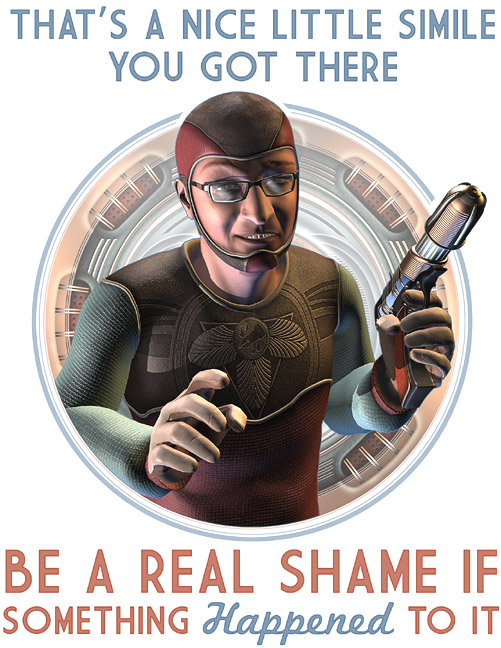
Back when my agent was negotiating the contract for Slaves of the Switchboard of Doom, I was aware that my editor had a lot of projects on his plate; heck, even he was aware. It was him who told me.
Which is great, of course: you like to see good people working, after all. But it concerned me a little.
So I proposed a new clause for the contract: the Pierrot Clause. Any time I had to wait for feedback from my editor, he would be required to wear a Pierrot costume. All day. Every day.
Me, I thought this was genius. Who wouldn’t want to see people contractually compelled to wear costumes out of Commedia dell’arte? I mean, it’s literate and it’s ridiculous. Everybody wins!
Maybe Steven King could get the Pierrot Clause into his contracts. Sadly, I just don’t have the clout; I had to give it up. This is perhaps the biggest reason why I’d like to be a bestselling author. I’m convinced that the Pierrot Clause is a thing that’s meant to be.
So, maybe next time. In the meantime, though, and in the most polite way possible, I am waiting for feedback from my very busy editor, and I’ve decided that what we have right here is the next best thing. I will imagine him giving me feedback. In full color. As often as necessary. With ray guns.
I can’t wait to see what he has to tell me about exposition and passive constructions. Maybe next week!
This entry was posted on Friday, August 14th, 2015
and was filed under Imaginary Editor
There have been no responses »
















